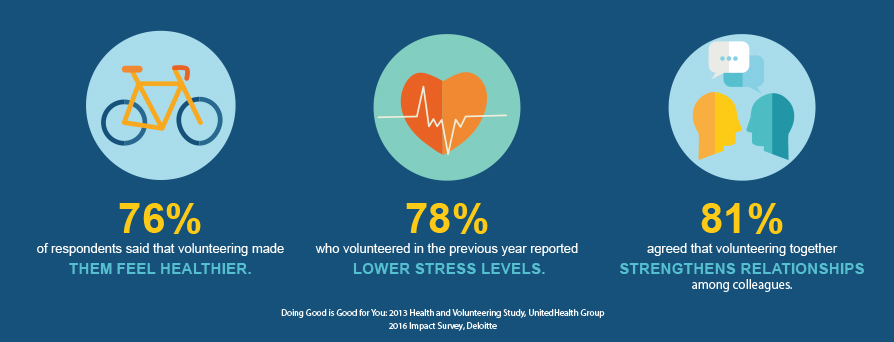Why Undervaluing Corporate Volunteerism is a Mistake.
Corporate volunteerism has real power.
The perception of a business’s corporate social responsibility has become increasingly important to both job seekers looking for a new position and for employers looking to keep good employees around. Some companies send employees to developing countries for month-long sabbaticals or one-day local community excursions, but many of the positive benefits of giving back happen no matter how you volunteer. So maybe it’s time to start thinking of corporate volunteerism less as a perk and more as a strategic business initiative.
Benefits of Corporate Volunteerism
Build your brand through volunteering.
Customers and potential employees expect companies to be about more than just making money, they expect companies to give back too. One of the drivers of this trend could be the number of Millennials currently active in the workforce and their vast amount of buying power. Millennials judge performance of a business on what it does and how it treats people, not on how popular a business is. They want to work for companies that give back to their communities, and they are motivated to lend their time and talents to a cause. For employers, Wharton’s Social Impact Initiative recommends businesses “embrace the spirit of innovation and experimentation” as they develop their own corporate social responsibility programs. Corporate volunteerism offers you the chance to build your brand around goodwill and attract the right people to your company.
Corporate volunteerism positively impacts employee health & engagement
The satisfaction you get from volunteering isn’t the only payoff; it can have effects on the health and morale of your employees. Volunteering gives employees the chance to get out of the office, be inspired, and rediscover meaning in their work – all of which helps them feel healthier and can reduce stress. Part of employee engagement relies on how well employees work together. Research shows that employees report better, stronger relationships with colleagues after volunteering together. It’s certainly a boon to find an activity that makes your employees feel better about themselves and your company at the same time.

Employee volunteering helps develop leadership qualities and soft skills.
Employee volunteering can increase your employees’ professional well-being. It offers the opportunity for them to network and learn new skills that makes them more valuable to your business. Volunteering is also to the job seekers advantage, as many recruiters are more likely to hire individuals with volunteer experience listed on their resumes.

